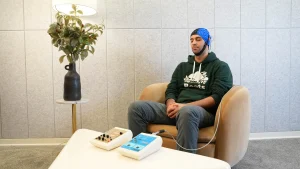Every June, Men’s Mental Health Month serves as a reminder that mental health doesn’t discriminate by gender. While conversations around mental health have gained traction in recent years, men still face significant barriers when it comes to acknowledging, discussing, and seeking help for their struggles. Societal expectations, stigma, and outdated definitions of masculinity can prevent many men from opening up about their emotions, leading to devastating consequences.
At Elumind, we believe that mental health is just as important as physical health. Our mission is to promote mental wellness and support individuals at all stages of life, including men navigating the unique challenges that come with mental health.
The Mental Health Landscape for Men in Canada
According to the Canadian Mental Health Association (CMHA), approximately 10 percent of Canadian men experience significant mental health issues in their lifetime. However, men are far less likely to seek help compared to women. This reluctance to access mental health services can be attributed to societal norms that encourage stoicism, self-reliance, and emotional suppression among men.
One of the most alarming statistics is that men account for approximately 75 percent of suicide deaths in Canada. This underscores the urgent need to create supportive environments where men feel safe to talk about their mental health without fear of judgment or shame.

Why Are Men Less Likely to Seek Help?
There are several factors contributing to the lower rates of mental health service utilization among men:
- Stigma: Many men feel embarrassed or ashamed to admit they’re struggling. The fear of being perceived as weak or incapable can discourage them from reaching out.
- Lack of Awareness: Some men may not recognize the symptoms of mental health issues or understand how they’re affecting their well-being and relationships.
- Cultural Expectations: Societal norms often pressure men to be the “provider” or the “rock,” which can make vulnerability feel threatening.
- Access and Availability: In some cases, men may not know where to find the right kind of help or may not feel that available services are tailored to their needs.
The Silent Struggles Men Face
Men may express psychological distress differently than women. Instead of openly discussing sadness or anxiety, some men may turn to unhealthy coping mechanisms like substance use, aggression, workaholism, or withdrawal. This can make it harder for others to recognize that they’re struggling and intervene in time.
Mental health challenges for men can also be linked to life transitions or societal roles. Job loss, divorce, becoming a father, or entering retirement can all act as triggers. These moments call for open conversations and targeted support systems.

Breaking the Silence and Opening the Dialogue
Men’s Mental Health Month is not just about recognizing the issue. It’s about actively working to break down the barriers and create spaces where men feel empowered to prioritize their mental well-being. Here are some ways we can do this:
- Normalize Mental Health Conversations: When men see others, especially public figures or peers, speaking openly about their mental health, it makes it easier for them to do the same.
- Promote Emotional Literacy: Helping men understand and express their emotions in healthy ways can reduce internalized stigma.
- Tailor Support Systems: Mental health services need to meet men where they are, whether that means flexible appointment times, male-led support groups, or alternative approaches like physical movement, coaching, and brain-based therapies.
How Elumind Supports Men’s Mental Health
At Elumind, we specialize in a range of evidence-based therapies and brain wellness solutions designed to help individuals optimize their mental health. For men in particular, our services offer a supportive, confidential space to address their unique challenges.
- QEEG Brain Mapping: This advanced tool helps identify functional imbalances in the brain, providing data-driven insights into areas related to mood, focus, and emotional regulation.
- Neurofeedback: A non-invasive training system that helps retrain the brain, supporting emotional resilience, stress management, and performance enhancement.
- Counselling and Coaching: Our clinical therapists provide individualized counselling tailored to men’s mental health needs, helping build emotional awareness and coping skills.
- Photobiomodulation (PBM) Therapy: This cutting-edge light therapy supports mood regulation, sleep improvement, and mental clarity.
Our goal is not just to treat symptoms, but to help men thrive at work, in their relationships, and in their personal lives.

Taking the First Step
One of the hardest parts of addressing mental health is acknowledging that help is needed. But asking for help is not a weakness, it’s a sign of strength. Whether you’re struggling yourself, or you’re concerned about a brother, father, son, or friend, now is the time to act.
Here’s how you can support men’s mental health this month:
- Share stories and experiences to raise awareness.
- Encourage open conversations at home and in the workplace.
- Educate others about the signs and symptoms of mental health issues.
- Donate to or partner with organizations that support men’s mental wellness.
- Book a complimentary consultation at Elumind to explore personalized wellness solutions.
A Final Thought
Men’s Mental Health Month is not just a campaign, it’s a movement. It’s a call to challenge outdated norms, prioritize emotional wellness, and make mental health care more accessible and acceptable for all. By coming together as a community, we can create a culture where men feel heard, supported, and empowered to live fully and freely.
If you or someone you love could benefit from a mental wellness check-in, we invite you to connect with our compassionate team at Elumind. Because every mind matters, and that includes men’s.








